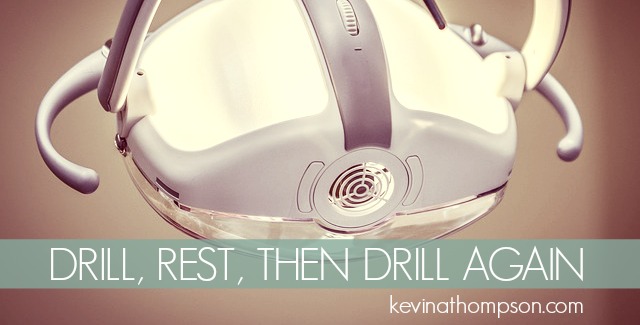Getting a tooth filled is not painful, but it is exhausting. Modern techniques have taken the pain of dental work away. The only part that is painful is the process of numbing the pain. While most shots do not hurt, a few of them carry a few seconds of significant pain. But after the shots, the pain is gone.
Yet the lack of pain doesn’t make the work refreshing. It’s wearisome.
When I was a kid, I had a good amount of dental work done. All these years later the work needs to be redone. Apparently fillings have a shelf life.
If it were just about pain tolerance, my dentist could give me a mouthful of shots and redo every filling I’ve ever had in one sitting. It would be cost-effective and time efficient; instead the work will be broken into several sessions. I will block the time on my schedule, drive to the dentist, wait the twenty minutes for my mouth to numb, let him do his work, and come back another time for the whole process to begin again.
Why? (See: Why Some Relationships Succeed and Others Fail)
Why wouldn’t I just do all the work at once. He would prefer it. I would only be inconvenienced once. And it would be over.
The problem is I can’t tolerate the discomfort for too long. While there isn’t any pain, dental work is not comfortable. There are bright lights, an apparatus holding my mouth open, foreign objects poking and prodding, drilling, and the irritating Mr. Thirsty making sure I don’t gag on my own saliva.
In short doses, it’s tolerable, but after a certain period of time I need a break.
A good dentist can sense it. She knows when the patient can endure drilling and when he needs a break. She knows the right time to get the work done and the right time to let the patient rest.
Our lives are filled with cavities. There are places where decay has set in and what we need the most is for someone to drill away that which is no longer useful and to fill the space with something productive. It’s a need. (See: Everyone’s Pain Is Just Below the Surface)
Yet if you have a drill in your hand, you can’t just focus on the need. You also have to consider the tolerance of the patient. Drilling needs to occur, but don’t blindly drill until the problem is solved. Drill then rest.
Rest, not because you need to be replenished, but because the patient needs time to recover. Their nerves need to relax. The bright light needs to be turned off. The tension needs to be released.
Rest and then drill again. (See: When Life Seems Out of Control)
When it comes to confronting problems, people tend to make one of two mistakes.
Some drill at the issue with no concern of others. They see a problem and they attack it. Their boldness is admirable, but their work is rarely effective. Instead of attacking a problem, it feels as though they are attacking people. The issue might be confronted but the relationship is broken.
Others never drill because drilling is never fun. No one goes to the dentist and asks him to drill on a tooth because they miss the feeling. Even with numb gums, having a tooth drilled is nerve-racking. It’s a necessary experience, but not an enjoyable one. Some people never confront difficult issues because confrontation is always uncomfortable. Afraid of making others uncomfortable, some people never deal with hard issues.
The need is for balance.
We must have the courage to engage in difficult situations and circumstances for the well-being of others and society.
We must have the discernment to know when those we are helping can best tolerate the drill and when we need to let them rest.
When a couple is going through a difficult time, I often encourage them to set aside thirty minutes every day to discuss the issue. Maybe an affair has occurred or trust has been violated in some other way. Emotions are raw. One spouse might want to constantly talk about the issue while the other spouse may want to never discuss it. (See: Two Steps to Solving 90% of Relationship Problems)
To help them avoid either extreme, I encourage them to have a set time. After the kids have gone to bed, when the demands of the day have died down, sit down and talk about how things are going. If an issue comes to mind before the meeting, write it down. If you think of something after the conversation, remember it for tomorrow. Don’t avoid the issue, but don’t let the issue dominate every conversation. No one can take an unending serious conversation. It would be too exhausting.
So it is with all difficult issues. Whether we are confronting a deep sin within society like racism, sexism, or physical abuse or we are dealing with a personal issue in a family or workplace, we must have courage and discernment.
Drill, rest, then drill again. It’s a good way for dentists and leaders.




4 Responses to Drill, Rest, Then Drill Again